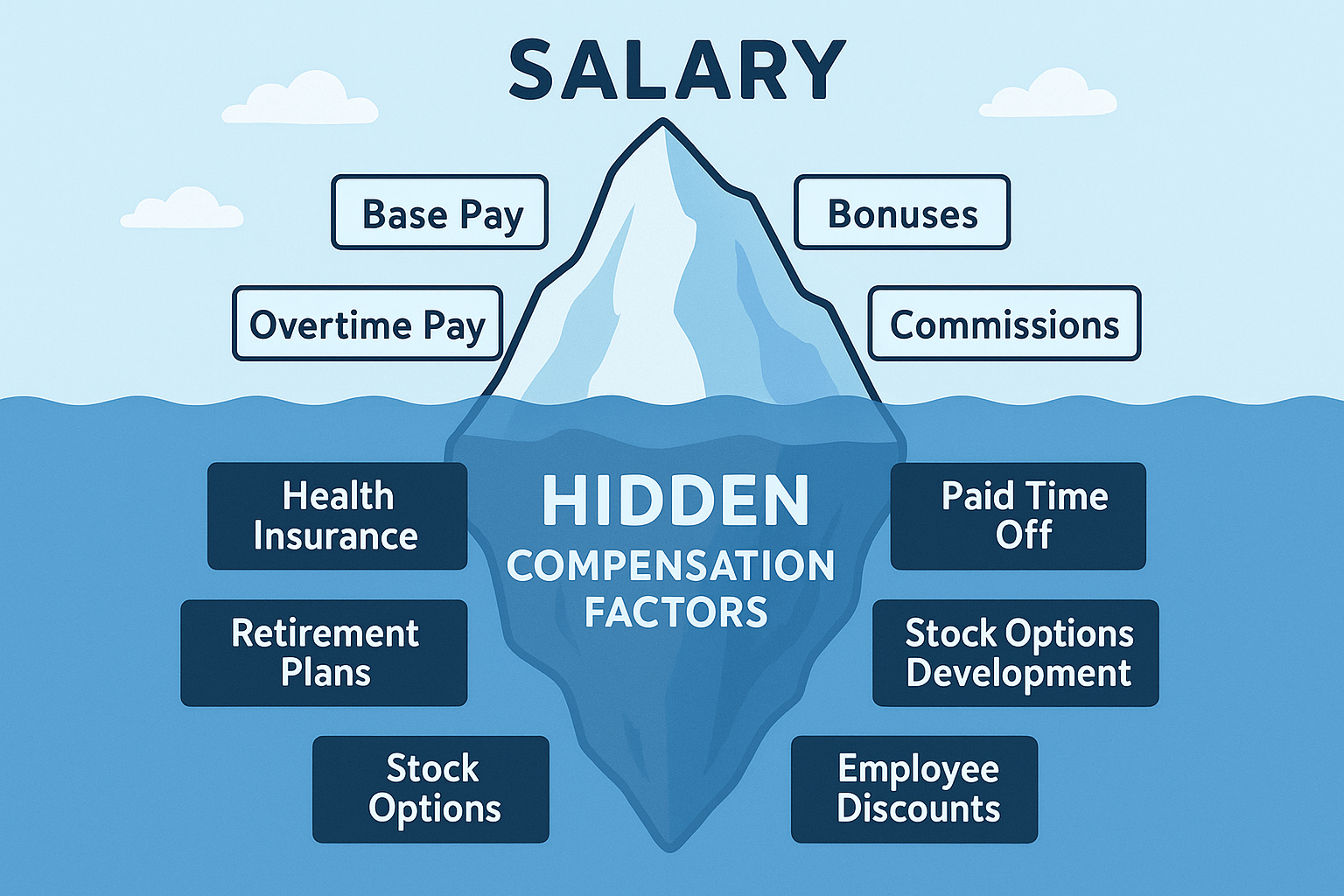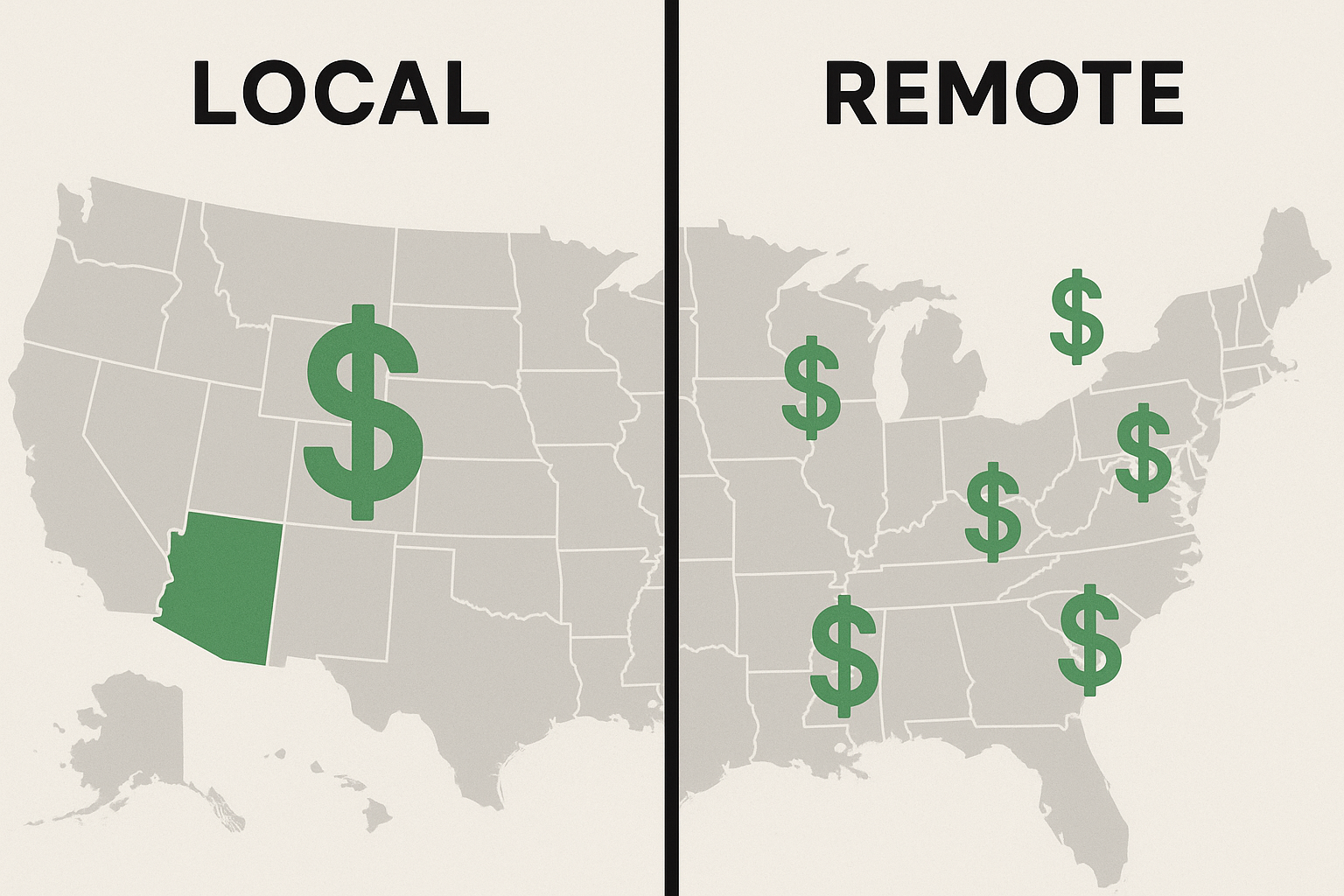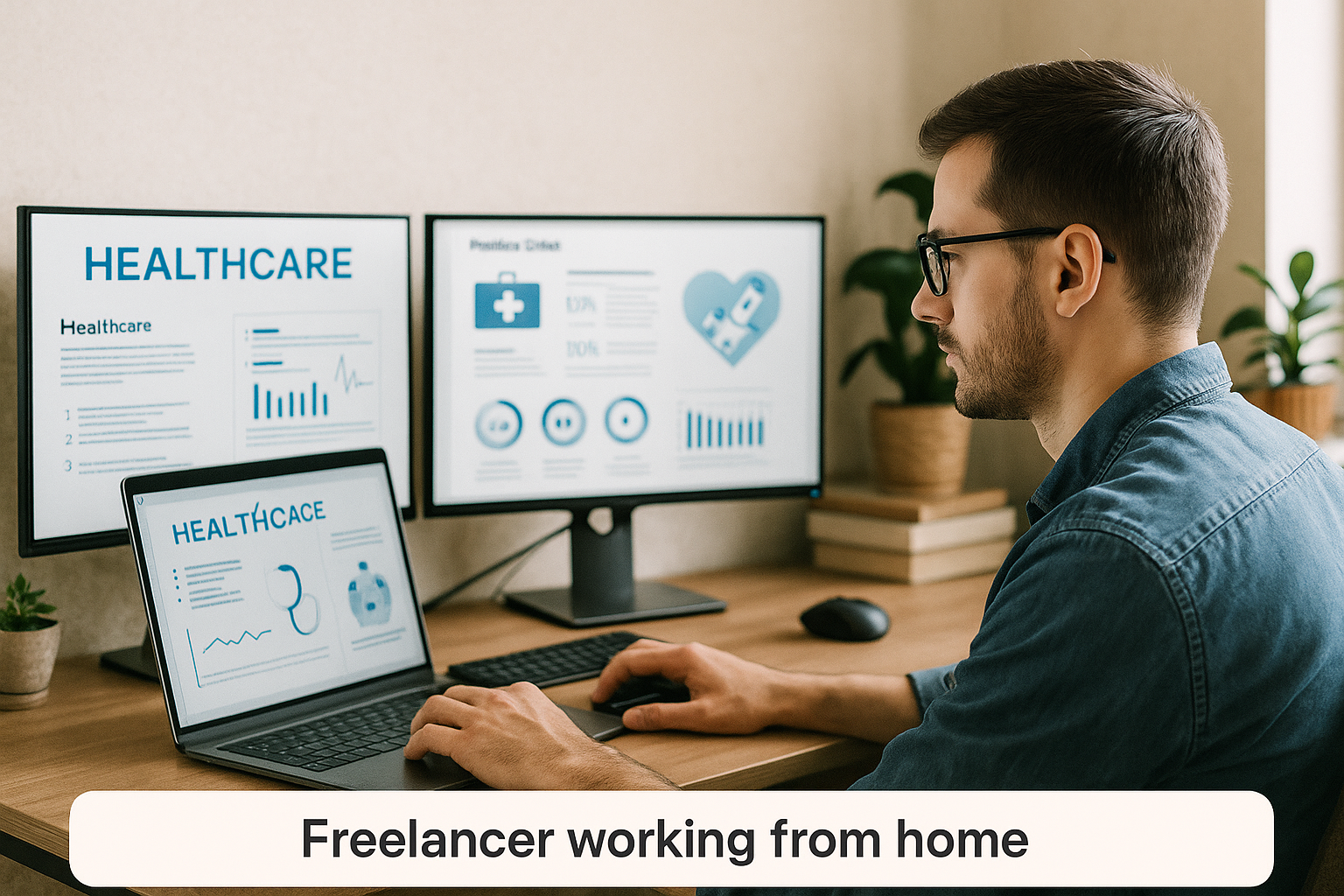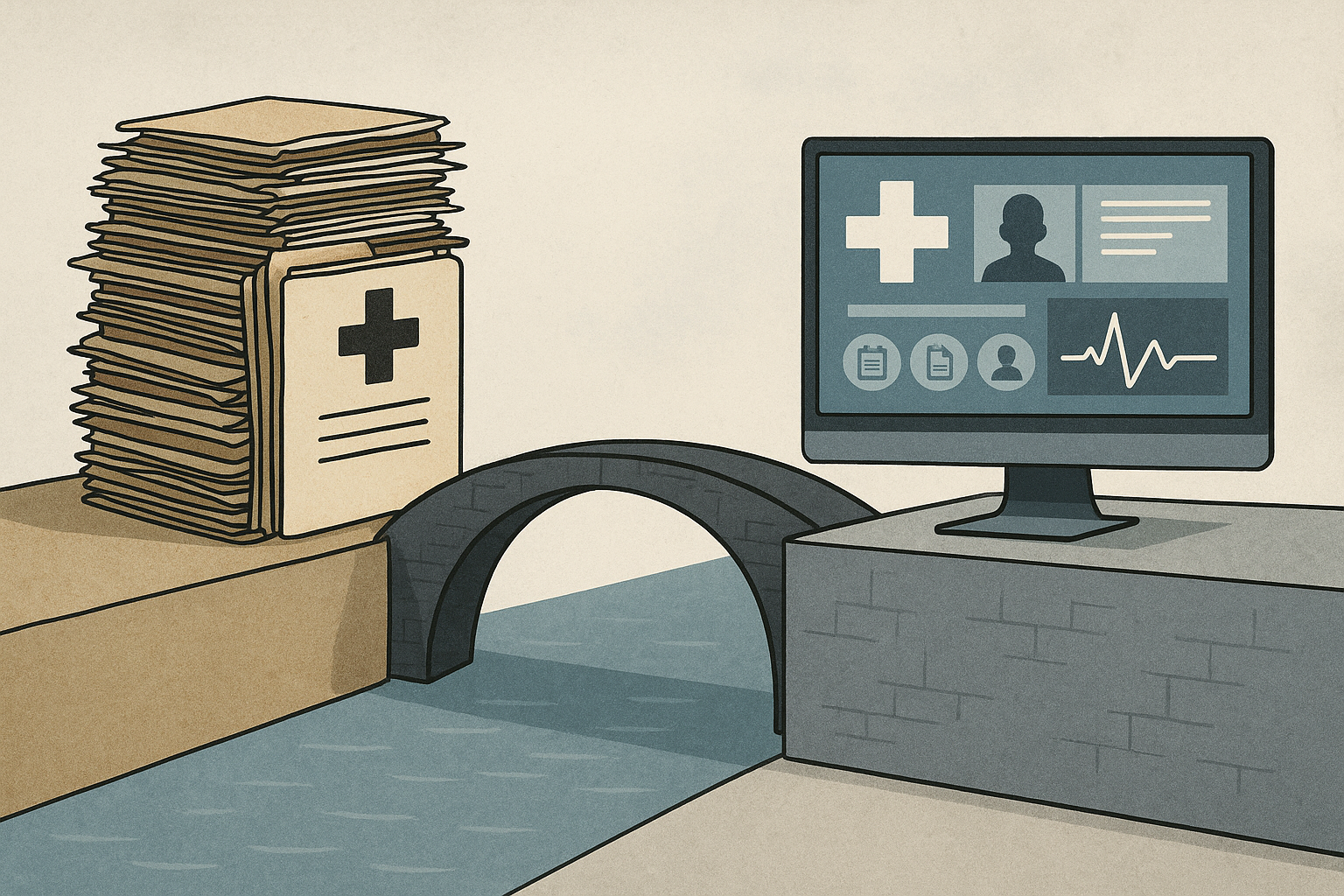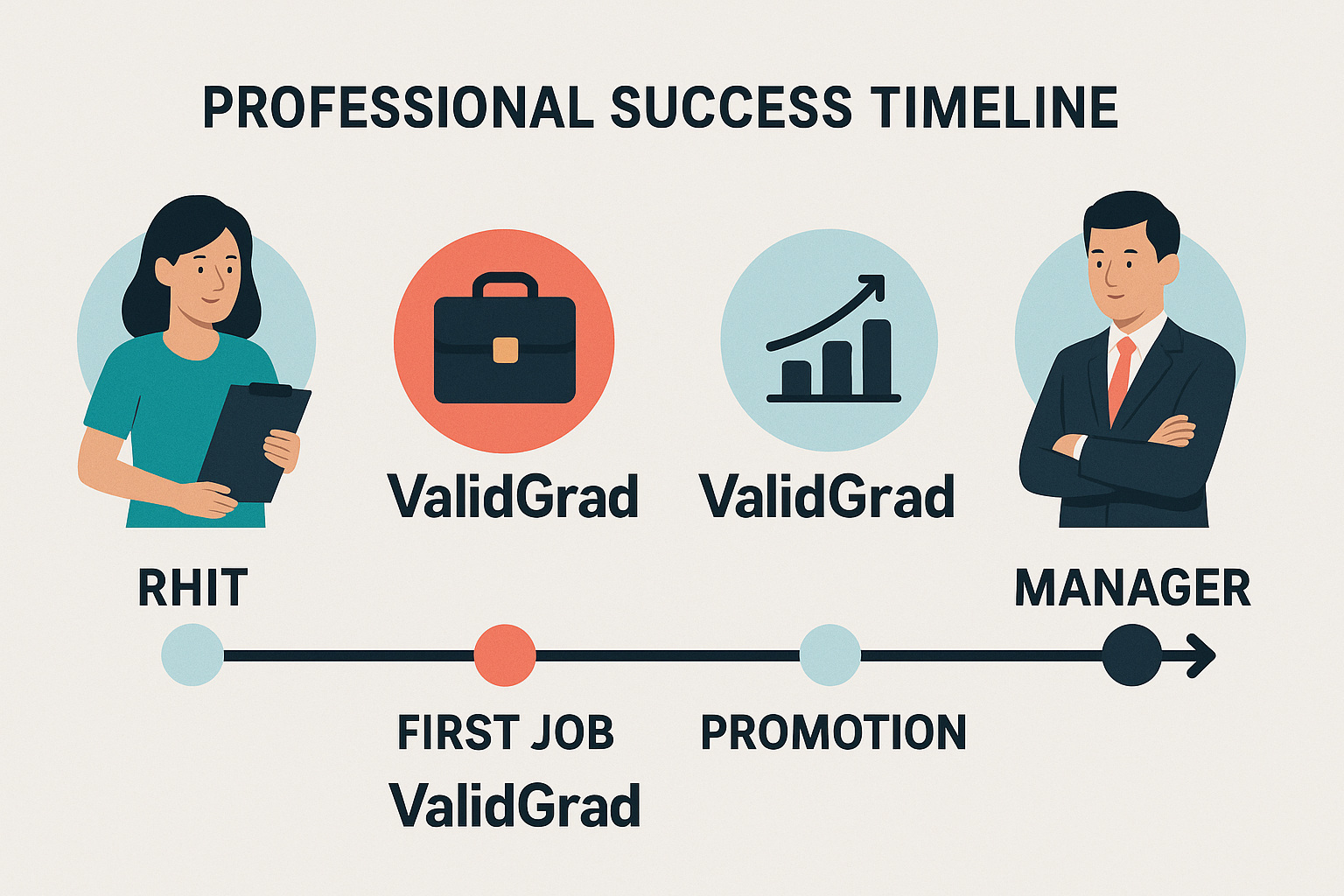I’ve spent years watching RHIT professionals settle for salaries that barely scratch the surface of their true earning potential. The Bureau of Labor Statistics projects employment of health information technologists and medical registrars will grow 16 percent from 2023 to 2033—much faster than average—with about 3,200 openings projected each year. This explosive growth creates unprecedented opportunities for RHIT professionals who understand strategic market positioning.
Most salary discussions focus on basic pay ranges, but the real money lies in understanding how healthcare organizations actually structure compensation. I’ll share insider knowledge about credential verification premiums, geographic arbitrage opportunities, and psychological factors that can boost your earning potential by 30-50%. You’ll discover why documentation security directly impacts your negotiation power and learn strategies that successful RHIT professionals use to maximize their compensation.
Table of Contents
- The Hidden Economics Behind RHIT Compensation
- Why Your Credentials Are Worth More Than You Think
- Geographic Strategies That Multiply Your Salary
- The Psychology of Confident Salary Negotiation
- Specialization: Your Fast Track to Premium Pay
- Beyond Traditional Employment: Entrepreneurial RHIT Income
- Protecting Your Career Investment with Smart Documentation
TL;DR
- RHIT professionals with properly documented credentials earn 15-20% more due to regulatory compliance requirements
- Remote work opportunities can increase your salary by 10-25% by accessing higher-paying geographic markets
- Specializing in emerging areas like AI-assisted coding or telehealth can boost earnings by 30-50%
- Confident credential presentation during negotiations correlates with 12-18% higher salary offers
- Strategic continuing education investments yield 200-400% returns when aligned with market demands
- RHIT consulting can generate $75-150 per hour compared to traditional employment salaries
- Backup documentation strategies prevent $3,000-$5,000 annual losses from missed opportunities
The Hidden Economics Behind RHIT Compensation
Healthcare employers don’t just pay for your skills—they pay significant premiums for verifiable credentials that can withstand regulatory scrutiny. I’ve discovered that organizations face severe penalties for employing unverified personnel in sensitive data roles, creating hidden salary tiers that most RHIT professionals never realize exist.
The regulatory compliance factor adds 15-20% to RHIT salaries because healthcare organizations can’t afford to take risks with unverified personnel. When auditors come knocking, your properly documented credentials become the organization’s shield against costly penalties and legal issues.
The Verification Premium That Changes Everything
Your RHIT certification becomes exponentially more valuable when employers can verify it without headaches. This verification premium exists because organizations face severe penalties for employing unverified personnel in sensitive data roles. I’ve seen RHIT professionals command higher starting salaries simply because their documentation was immediately accessible and verifiable.
The peace of mind factor plays a huge role here. When hiring managers know they won’t face verification delays or compliance issues, they’re willing to pay more upfront. Your properly documented RHIT qualifications become worth more than you might think because they eliminate risk for the employer.
Why Regulatory Compliance Drives Your Pay Scale
Healthcare organizations operate under intense regulatory scrutiny. Every RHIT position involves access to protected health information, making credential verification a critical compliance requirement. When your documentation is bulletproof, you’re eliminating a major headache for employers—and they’ll pay extra for that peace of mind.
The audit trail matters more than most RHIT professionals realize. During compliance reviews, organizations must demonstrate that every employee with access to sensitive data meets qualification requirements. Your ability to provide immediate verification gives you leverage in salary negotiations.
Credential Verification Checklist:
- ☐ Keep original certification documents in multiple secure locations
- ☐ Create digital backups of all educational transcripts
- ☐ Build relationships with your school’s registrar office
- ☐ Document every continuing education credit meticulously
- ☐ Maintain updated contact information with AHIMA
- ☐ Store documents in fireproof/waterproof containers
- ☐ Create encrypted digital copies in cloud storage
The Career Mobility Documentation Gap
Many RHIT professionals unknowingly cap their earning potential by failing to maintain comprehensive documentation of their educational journey. Each missing or damaged credential can cost you $3,000-$5,000 annually in lost advancement opportunities. I’ve watched talented professionals miss promotions because they couldn’t quickly verify their continuing education credits.
Sarah, an experienced RHIT professional, missed out on a $58,000 management position because she couldn’t quickly verify her continuing education credits when the employer needed to fast-track the hiring process. The position went to a less experienced candidate who had immediate access to all required documentation, costing Sarah approximately $8,000 in lost annual income.
For professionals who have experienced credential loss, understanding the replacement diploma process becomes crucial for maintaining career momentum and salary growth potential. The ability to quickly replace lost documentation can mean the difference between seizing an opportunity and watching it slip away.
Time-sensitive opportunities don’t wait for credential reconstruction. When a high-paying RHIT position opens up, employers often make decisions within days. Having your documentation ready gives you a competitive advantage that translates directly to higher compensation.
Why Your Credentials Are Worth More Than You Think
The psychological impact of having secure, accessible credentials affects your negotiation confidence and career trajectory in ways that directly translate to higher RHIT salaries. When you know your documentation is bulletproof, you negotiate differently—and employers notice this confidence immediately.
RHIT professionals who have immediate access to verified credentials negotiate salaries 12-18% higher than those who worry about verification issues. This isn’t just correlation—it’s causation. Confidence during the hiring process creates a psychological advantage that employers interpret as competence and reliability.
The Confidence-Compensation Connection That Actually Works
Your mental state during salary negotiations directly impacts the outcome. When you’re worried about credential verification, that anxiety shows up in your body language, voice tone, and negotiation approach. Employers pick up on these subtle cues and adjust their offers accordingly.
The growing emphasis on professional certifications across healthcare has created new opportunities for RHIT professionals. As noted in recent industry analysis, “RHIT certification, offered by the American Health Information Management Association (AHIMA), is ideal for professionals managing and securing medical records” with an average salary of $65,011, highlighting the tangible value of proper certification in today’s market.
I’ve observed that RHIT professionals with organized credential portfolios consistently receive higher initial offers. The connection between personal organization and professional competence isn’t lost on healthcare employers who need meticulous attention to detail in their information management teams.
The 72-Hour Rule for Maximum Salary Impact
Employers often make final hiring decisions within 72 hours of credential verification. Having immediate access to your documentation means you can capitalize on optimal salary offers when timing matters most. Delays in verification often result in lower offers or missed opportunities entirely.
The urgency factor works in your favor when you’re prepared. Healthcare organizations operate on tight timelines, especially when filling critical RHIT positions. Your ability to provide instant verification can push you to the top of the candidate list and justify premium compensation.
Professional Presentation Standards That Pay Off
How you present and organize your credentials during interviews directly correlates with salary offers. Employers see credential organization as a preview of your attention to detail in healthcare information management—a skill they’re willing to pay premium rates for.
Understanding how to display certificates professionally can significantly impact employer perception and salary negotiations during the interview process. The visual presentation of your RHIT credentials sends immediate signals about your professionalism and organizational skills.
Your credential presentation becomes a silent sales pitch. When employers see well-organized, easily accessible documentation, they’re already imagining how you’ll handle their sensitive healthcare information. This mental connection between personal organization and professional capability justifies higher compensation offers.
| Credential Presentation Level | Average Salary Impact | Employer Perception |
|---|---|---|
| Disorganized/Missing Documents | -8% to -15% | Unprofessional, risky hire |
| Basic Documentation | Baseline (0%) | Meets minimum requirements |
| Well-Organized Portfolio | +5% to +8% | Detail-oriented, prepared |
| Comprehensive Digital Portfolio | +12% to +18% | Professional, tech-savvy |
| Instant Verification Ready | +15% to +22% | Exceptional, low-risk hire |
Geographic Strategies That Multiply Your Salary
RHIT certification’s portability creates unique opportunities for strategic career positioning and geographic arbitrage. Smart professionals leverage location flexibility to access higher-paying markets while maintaining lower living costs, effectively multiplying their purchasing power.
The remote work revolution has fundamentally changed how RHIT professionals can approach salary optimization. You’re no longer limited by your local market’s compensation standards when you can access national opportunities from anywhere.
Remote Work Premium Calculations
RHIT professionals working remotely often command salaries 10-25% higher than their local market rate by accessing high-demand geographic markets. The key is understanding how to position yourself for these opportunities and negotiate based on the value you provide rather than your physical location.
According to recent salary data, “RHITs in California average $95,520/year, thanks to high demand in cities like Los Angeles and San Francisco” while “26% of RHITs now work hybrid or fully remote, balancing pay with flexibility.”
The math becomes compelling when you consider cost of living differentials. An RHIT professional earning a California salary while living in a lower-cost state can achieve purchasing power that exceeds traditional career advancement paths. This geographic arbitrage strategy requires understanding how to market your RHIT skills to high-paying regions.
Market Research That Actually Matters
Effective salary negotiation requires understanding not just your local market, but the national landscape of RHIT compensation. High-demand regions like California, New York, and Texas set salary benchmarks that you can leverage even from lower-cost areas.
The data tells a compelling story about geographic salary variations. When you understand these differentials, you can make strategic decisions about where to focus your job search and how to position your RHIT credentials for maximum impact.
| Geographic Market | Average RHIT Salary | Cost of Living Index | Effective Purchasing Power |
|---|---|---|---|
| California (Remote) | $95,520 | 138.5 | $69,000 equivalent |
| National Average | $70,300 | 100.0 | $70,300 baseline |
| Midwest (Local) | $63,730 | 89.2 | $71,434 equivalent |
| Texas (Remote) | $78,500 | 93.9 | $83,600 equivalent |
| Remote Arbitrage | $85,000+ | Variable | $95,000+ potential |
Virtual Presence Optimization for Higher Pay
Creating a professional virtual presence that showcases your RHIT credentials opens doors to higher-paying remote opportunities that traditional job searches miss. This isn’t about social media—it’s about strategic professional positioning that attracts premium employers.
Your online professional presence becomes your 24/7 sales representative. When healthcare organizations search for RHIT talent, they’re looking for professionals who demonstrate competence and reliability through their digital footprint. The way you present your credentials online directly impacts the opportunities that find you.
Geographic Arbitrage Strategy Template:
- Market Research Phase
- Identify high-paying remote-friendly markets
- Calculate cost of living differentials
- Research employer remote work policies
- Positioning Phase
- Optimize LinkedIn for target markets
- Highlight remote work experience
- Emphasize technology proficiency
- Negotiation Phase
- Present value-based compensation arguments
- Reference market-rate data from target regions
- Demonstrate cost savings to employer
The Psychology of Confident Salary Negotiation
Healthcare organizations recognize that RHIT professionals who proactively manage their own credential security will apply the same diligence to patient data management. This connection between personal organization and professional competence justifies higher compensation in employers’ minds.
The backup plan premium exists because RHIT professionals who maintain comprehensive documentation strategies demonstrate the risk management thinking that healthcare employers value highly. This proactive approach often results in salary premiums because it signals the kind of forward-thinking that organizations need.
Risk Management Mindset Value
Your approach to managing your own credentials sends powerful signals about how you’ll handle organizational responsibilities. Healthcare employers are constantly evaluating risk, and they pay premium salaries for RHIT professionals who demonstrate proactive risk management in their personal professional development.
Michael, an RHIT professional, leveraged his comprehensive documentation system during a salary negotiation by demonstrating how his organizational skills had prevented data breaches at his previous employer. This real-world example of risk management thinking resulted in a 16% salary increase above the initial offer, as the employer valued his proactive approach to protecting sensitive information.
The connection between personal organization and professional competence isn’t subtle to healthcare employers. When you demonstrate meticulous attention to your own credential management, they immediately understand that you’ll bring the same level of care to their patient data and regulatory compliance requirements.
Emergency Preparedness Protocol
Having a plan for rapid credential replacement shows the contingency thinking that healthcare organizations desperately need in their information management teams. This isn’t paranoia—it’s professional preparedness that translates to higher pay.
Developing a comprehensive academic documents backup strategy ensures RHIT professionals never face career-limiting credential delays during critical opportunities. The ability to quickly recover from documentation emergencies demonstrates the kind of forward-thinking that healthcare employers value most.
Your emergency preparedness becomes a competitive advantage. When employers see that you’ve thought through potential credential issues and have solutions ready, they’re looking at someone who approaches problems proactively rather than reactively.
Emergency Documentation Protocol:
- Immediate Access (0-24 hours): Digital copies in secure cloud storage
- Short-term Replacement (1-7 days): Certified copies from institutions
- Long-term Recovery (1-4 weeks): Full document reconstruction process
- Backup Contacts: Registrar offices, AHIMA, previous employers
- Alternative Verification: Professional references, work portfolio
Specialization: Your Fast Track to Premium Pay
RHIT professionals who develop expertise in emerging areas can command salary premiums of 30-50% above baseline wages. The key is identifying which specializations align with market demands and positioning yourself as the go-to expert in those niches.
Healthcare’s digital transformation has created entirely new categories of high-paying RHIT positions. These opportunities didn’t exist five years ago, but they’re driving some of the highest compensation packages in the field today.
Emerging Technology Integration Opportunities
Healthcare organizations are paying premium salaries for RHIT professionals who can bridge traditional health information management with new technologies. Blockchain medical records, AI-powered diagnostic coding, and telehealth documentation represent areas where specialized RHIT knowledge commands exceptional compensation.
The healthcare industry’s digital transformation has created new opportunities for certified professionals. As educational institutions expand their offerings, “Southern New Hampshire University’s Bachelor of Science in Health Information Management program meets educational requirements to sit for the Registered Health Information Administrator (RHIA) credential exam”, demonstrating the industry’s push toward advanced credentials and specialized skills.
The intersection of traditional RHIT skills with emerging technology creates unique value propositions. Healthcare organizations need professionals who understand both the regulatory requirements of health information management and the technical capabilities of new systems.
Niche Market Positioning Strategies
Specializing in specific healthcare sectors while maintaining RHIT certification creates unique value propositions that justify higher compensation. Mental health, oncology, and pediatrics each have specialized documentation requirements that command premium rates when you become the recognized expert.
The narrower your niche, the higher your potential premium—if you choose the right niche. Healthcare organizations will pay significantly more for RHIT professionals who understand the specific challenges and requirements of their specialty area.
High-Demand Specialization Areas:
- AI-Assisted Coding: 35-45% salary premium
- Telehealth Documentation: 25-35% premium
- Regulatory Compliance: 20-30% premium
- Data Analytics Integration: 30-40% premium
- Cybersecurity for Health Records: 40-50% premium
Continuing Education ROI Analysis
Strategic continuing education investments can yield 200-400% returns in salary increases, but only when aligned with market demands and properly documented for employer verification. Random education doesn’t pay—strategic education does.
Jennifer invested $2,500 in specialized telehealth certification courses and documented her learning progression meticulously. Within 18 months, she secured a remote position paying $78,000 annually—a $18,000 increase from her previous role. Her ROI calculation showed a 720% return on her education investment, demonstrating the power of strategic specialization.
The key is choosing continuing education that addresses specific market gaps rather than general professional development. Healthcare organizations pay premium rates for RHIT professionals who can solve specific problems they’re facing right now.
Beyond Traditional Employment: Entrepreneurial RHIT Income
RHIT certification opens doors to consulting, freelance, and business ownership opportunities that can exceed traditional salary limitations by 200-500%. Success requires understanding how to position your credentials strategically and develop business skills alongside your technical expertise.
The consulting market for RHIT professionals has exploded as healthcare organizations seek specialized expertise without the overhead of full-time employees. This shift creates opportunities for entrepreneurial RHIT professionals to build practices that generate significantly higher income than traditional employment.
The Consulting Premium Model
RHIT professionals who transition to consulting can charge $75-150 per hour compared to traditional salaries. However, success requires strategic positioning, business development skills, and the confidence that comes from having secure, verifiable credentials.
The hourly rate advantage becomes compelling when you calculate annual potential. An RHIT consultant working 30 billable hours per week at $100 per hour generates $156,000 annually—significantly more than most traditional RHIT positions offer.
Niche Consulting Specialization
Focusing on specific healthcare sectors or compliance areas allows RHIT consultants to command premium rates while building sustainable client relationships. The key is becoming the recognized expert in a specific area rather than trying to serve everyone.
Healthcare organizations prefer working with consultants who understand their specific challenges. An RHIT professional who specializes in mental health documentation requirements can charge significantly more than a generalist because they bring targeted expertise that directly addresses client needs.
Consulting Rate Structure Template:
- General HIM Consulting: $75-95/hour
- Compliance Auditing: $95-125/hour
- System Implementation: $110-150/hour
- Training and Education: $85-115/hour
- Expert Witness Services: $150-250/hour
Freelance Market Dynamics
The growing demand for flexible healthcare information management services creates opportunities for RHIT professionals to earn premium rates while maintaining work-life balance. Success depends on understanding how to position your credentials to attract high-paying clients.
Freelance RHIT work has evolved beyond basic data entry to include complex project management, system implementation support, and specialized compliance consulting. These higher-value services command rates that exceed traditional employment compensation.
The platform economy has made it easier for RHIT professionals to find freelance opportunities, but success requires understanding how to differentiate yourself from commodity providers. Your credentials become the foundation for premium positioning in competitive marketplaces.
Protecting Your Career Investment with Smart Documentation
ValidGrad’s diploma and transcript replacement services help RHIT professionals maintain the documentation security that healthcare employers demand. When you’ve invested years in education and certification, protecting that investment through backup documentation isn’t just smart—it’s essential for maximizing your salary potential.
For RHIT professionals facing credential emergencies, understanding how to get a diploma replacement quickly can prevent thousands in lost salary opportunities. The ability to rapidly replace damaged or lost credentials eliminates barriers to pursuing time-sensitive career opportunities.
The peace of mind from knowing you can quickly replace damaged or lost credentials allows you to negotiate with confidence and pursue opportunities without documentation anxiety. In a field where credential verification can make or break career opportunities, ValidGrad’s services represent a strategic investment in your long-term salary growth.
Ready to secure your RHIT career investment? Contact ValidGrad today to learn how our documentation services can protect your earning potential.
The Institutional Prestige Factor in RHIT Compensation
Healthcare organizations often pay salary premiums based on where you obtained your RHIT credentials, creating hidden hierarchies in compensation that aren’t widely discussed. Understanding these biases—and how to overcome them—can significantly impact your earning potential regardless of where you went to school.
The educational pedigree factor affects initial salary offers more than long-term career growth. While prestigious institutions might give you a head start, your performance and specialized skills ultimately determine your earning trajectory in the RHIT field.
The Educational Pedigree Premium
RHIT professionals from well-known institutions can command 8-12% higher starting salaries, but this advantage isn’t permanent. You can neutralize institutional bias through strategic career moves, exceptional performance metrics, and skill development that speaks louder than your diploma’s letterhead.
Your RHIT exam performance and real-world results matter more than your school’s reputation in the long run. Healthcare employers care about competence and reliability, not where you learned your skills. The key is demonstrating value through measurable outcomes rather than relying on institutional prestige.
Overcoming Institutional Bias
RHIT professionals from lesser-known institutions can level the playing field by focusing on certification scores, specialized training, and demonstrable outcomes rather than institutional name recognition. Your ability to solve real healthcare information management problems matters more than your alma mater’s ranking.
Building a portfolio of successful projects and measurable contributions creates credibility that transcends educational pedigree. When you can demonstrate specific outcomes and improvements you’ve achieved, employers focus on your capabilities rather than your school’s reputation.
Performance-Based Positioning Strategies:
- ☐ Emphasize high RHIT certification exam scores
- ☐ Highlight continuing education achievements
- ☐ Document measurable workplace contributions
- ☐ Build a portfolio of successful projects
- ☐ Obtain additional specialized certifications
- ☐ Develop expertise in emerging technologies
Network Expansion Strategy
Building professional relationships within healthcare information management provides access to opportunities where skills matter more than educational pedigree. The right connections can open doors to positions where your competence overshadows your alma mater.
Professional networking in the RHIT field focuses on competence and reliability rather than educational background. When you demonstrate expertise and build trust within the professional community, opportunities flow based on your reputation rather than your diploma’s letterhead.
The Certification Timing Advantage
When you obtained your RHIT certification relative to industry changes and healthcare technology evolution significantly impacts your salary trajectory and market value. Early adopters and those with experience bridging old and new systems often command premium compensation.
Healthcare information management has undergone massive changes in recent years. RHIT professionals who have lived through these transitions possess valuable experience that organizations need when implementing new systems or processes.
Technology Transition Value
Having lived through major healthcare IT implementations makes you more valuable to organizations undergoing similar changes. EHR transitions, system integrations, and regulatory changes create demand for RHIT professionals who can guide organizations through complex transformations.
Your experience with technology transitions becomes a competitive advantage when organizations face similar challenges. The ability to help healthcare organizations avoid costly mistakes and implementation delays justifies premium compensation for experienced RHIT professionals.
Your Transition Experience Becomes Valuable When You Can:
- Guide organizations through system migrations
- Train staff on new healthcare technologies
- Troubleshoot integration challenges
- Maintain data integrity during transitions
- Document best practices for future implementations
Legacy System Expertise vs. Modern Integration Skills
Paradoxically, RHIT professionals with experience in older systems can command premium salaries when organizations need to maintain or transition from legacy healthcare information systems. Meanwhile, those who can bridge traditional health information management with modern data analytics and AI tools represent the highest-paid segment of the profession.
The sweet spot lies in understanding both legacy systems and modern technologies. Healthcare organizations need RHIT professionals who can maintain existing systems while implementing new capabilities, creating unique value propositions that justify premium compensation.
Advanced Freelance and Consulting Strategies
Beyond basic consulting, sophisticated RHIT professionals are building scalable businesses that generate multiple income streams. These approaches require understanding platform optimization, client relationship management, and how to position your credentials for maximum market impact.
The evolution from employee to entrepreneur requires developing business skills alongside your RHIT expertise. Successful consulting practices combine technical competence with strategic business development and client relationship management.
Platform Strategy Optimization
Successfully leveraging freelance platforms requires understanding how to position RHIT credentials to attract high-paying clients while avoiding commodity pricing. The key is demonstrating specialized expertise rather than general healthcare information management skills.
Your platform presence becomes your digital storefront. Healthcare organizations searching for RHIT expertise make decisions based on how you present your credentials and experience. Professional presentation and strategic positioning directly impact the rates you can command.
Portfolio Development Approach
Building a portfolio of successful healthcare information management projects creates the credibility needed to command premium freelance rates. Each project should showcase specific outcomes and demonstrate your ability to solve complex problems that justify higher compensation.
Your project portfolio tells the story of your RHIT expertise better than any resume. When potential clients see documented results and successful implementations, they’re willing to pay premium rates for proven competence.
Client Relationship Management
Developing long-term relationships with healthcare organizations as a freelance RHIT professional creates recurring revenue streams that exceed traditional employment income. These relationships often evolve into retainer agreements and exclusive consulting arrangements.
The transition from project-based work to ongoing relationships represents the highest level of freelance success. When healthcare organizations trust your RHIT expertise enough to maintain ongoing relationships, you’ve created sustainable income that exceeds traditional employment limitations.
Implementation Consulting Specialization
Specializing in healthcare information system implementations allows RHIT professionals to command project-based fees that far exceed traditional salaries. Organizations pay premium rates for professionals who can ensure smooth transitions and minimize disruption to patient care.
System implementation projects represent some of the highest-paying opportunities in the RHIT field. Healthcare organizations understand that implementation failures cost significantly more than premium consulting fees, making experienced RHIT professionals valuable investments.
Regulatory Compliance Consulting
RHIT professionals who specialize in helping healthcare organizations navigate changing regulations can build six-figure consulting practices. This niche requires staying current with regulatory changes and understanding how they impact different types of healthcare organizations.
Regulatory compliance represents an ongoing need that creates sustainable consulting opportunities. Healthcare organizations need RHIT professionals who can interpret complex regulations and implement practical compliance solutions.
ValidGrad’s Strategic Role in Advanced RHIT Career Development
The comprehensive nature of RHIT career development—from initial certification through advanced specialization and potential entrepreneurship—makes credential security absolutely critical at every stage. ValidGrad’s services provide the documentation foundation that supports every aspect of RHIT salary optimization, whether you’re climbing the corporate ladder or building your own practice.
For RHIT professionals considering entrepreneurial paths, having secure replacement diplomas readily available eliminates barriers to pursuing time-sensitive consulting opportunities. The ability to quickly provide credential verification to potential clients can mean the difference between winning and losing lucrative contracts.
When you’re exploring entrepreneurial paths, ValidGrad’s services become even more valuable. Building your own consulting business or freelance practice requires the ability to quickly provide credential verification to potential clients. The professional presentation standards that ValidGrad maintains align perfectly with the attention to detail that healthcare clients expect from their information management partners.
For RHIT professionals pursuing advanced specializations or geographic opportunities, having backup documentation removes barriers to seizing time-sensitive opportunities. Whether you’re applying for a high-paying remote position or bidding on a lucrative consulting contract, credential delays can cost you thousands in lost opportunities.
Ready to protect your RHIT career investment and unlock your full earning potential? Get started with ValidGrad and ensure your credentials never hold you back from the opportunities you deserve.
Final Thoughts
Your RHIT salary potential extends far beyond basic pay scales when you understand the hidden factors that drive healthcare compensation. From verification premiums to geographic arbitrage, from specialization opportunities to entrepreneurial paths, multiple strategies can significantly boost your earning potential. The common thread connecting all these opportunities is the critical importance of maintaining secure, accessible credentials that support confident career moves and salary negotiations.
Whether you’re just starting your career or looking to maximize existing opportunities, understanding essential documents for healthcare professionals ensures you’re always prepared for advancement. The strategic approach to RHIT salary optimization requires understanding that your credentials are the foundation of your professional value proposition.
According to recent industry data, “the typical salary for a RHIT in the U.S. hovers around $70,300 per year, or roughly $34 per hour”, but this baseline figure masks the significant variation that strategic positioning can create. The rapid growth in healthcare information management is evident in the job market, with “jobs for medical records and health information technicians expected to increase 20% through 2018” according to Bureau of Labor Statistics data, creating unprecedented opportunities for skilled professionals.
Talking Points:
- Document security directly impacts earning potential through verification premiums and negotiation confidence
- Geographic flexibility and remote work opportunities can increase salaries by 10-25% without relocating
- Specialization in emerging healthcare technologies offers the highest salary growth potential
- Entrepreneurial paths like consulting can multiply traditional salary limitations
- Proactive credential management demonstrates the risk-thinking healthcare employers value most
RHIT Salary Optimization Action Plan:
Phase 1: Foundation (Months 1-3)
- ☐ Secure all original credentials in fireproof storage
- ☐ Create comprehensive digital backup system
- ☐ Establish relationships with registrar offices
- ☐ Document current skill set and certifications
Phase 2: Strategic Positioning (Months 4-6)
- ☐ Research target geographic markets
- ☐ Identify high-demand specialization areas
- ☐ Optimize professional online presence
- ☐ Build portfolio of accomplishments
Phase 3: Implementation (Months 7-12)
- ☐ Apply strategic specialization knowledge
- ☐ Negotiate salary using documented value proposition
- ☐ Explore remote/consulting opportunities
- ☐ Maintain ongoing credential security
Emergency Credential Recovery Template:
Immediate Response (0-24 hours):
- Contact ValidGrad for expedited replacement services
- Access digital backups from secure cloud storage
- Notify current employer of situation
- Begin alternative verification process
Short-term Actions (1-7 days):
- Request certified copies from educational institutions
- Contact AHIMA for certification verification
- Gather professional references
- Document timeline for employer
Long-term Recovery (1-4 weeks):
- Complete full document reconstruction
- Update all backup systems
- Review and improve security protocols
- Implement preventive measures
Every aspect of how you manage, present, and leverage your RHIT credentials directly impacts your earning potential in ways that most professionals never fully realize. The strategic approach to maximizing your compensation requires understanding that documentation security isn’t just about protecting paper—it’s about protecting your professional future and unlocking opportunities that can transform your career trajectory.


